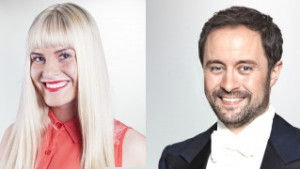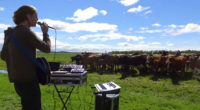
Tonight, Iceland kicked off their selection with the first of two semi-finals held before the grand final. Out of the five acts competing tonight, two made it through to the final while the remaing ones will have to hope to be saved by the jury later on.
On the 15th of February six acts will compete in the final of Söngvakeppnin 2014, also known as the Icelandic Eurovision selection. The acts are chosen via two semi-finals with two direct qualifiers each and two to get a second chance by the jury. Tonight saw the first of these heats.
The 10 songs selected to participate in the semi-finals were chosen out of a total of 297 entries receieved.
The songs: (To read more about the five participants check out our Get To Know article)
Sverrir Bergmann – Dönsum burtu blús (dance away the blues) (T & M: Pálmi Ragnar Ásgeirsson, Ásgeir Orri Ásgeirsson, Sæþór Kristjánsson)
We are the last half of the ’80’s, everyone is tuned into DR where Jørgen de Mylius has just kicked off Dansk Melodi Grand Prix. Sverrir Bergmann now takes the stage to sing the first of the competing songs. But wait, there is something wrong. He sings in Icelandic! Yes, Iceland was previously a part of Denmark, but still, this is unusual. You spent the first few seconds of this song wondering what is going on, until it hits you: "It is just the eighties coming back", as Ruffus sang for Estonia in 2003. That is the answer to what is going on here. We are not in Denmark, but in Iceland afterall and we are not in the ’80’s, but in 2014. You have heard this song before, and some will consider it outdated, whereas others, myself included, will like it. Mainly for its nostalgy and its energy. It brings you in a good mood… just like these songs did 25 years ago.
Sverrir has five musicians with him on stage. All of them, including Sverrir himself, are dressed in dark red trousers, white shirts and blue suspensers with white polka dots. On stage this song comes across with a lot of energy, not because a lot is happening but because you can see how much they enjoy it.
Greta Mjöll Samúelsdóttir – Eftir eitt lag (After one song) (T:Bergrún Íris Sævarsdóttir / M: Ásta Björg Björgvinsdóttir)
Where the first one might have borrowed from the Danish musicscene, we are now back in Iceland. It is a pop folk song, where the Icelandic language is extremely suitable. It starts out like as a very fascinating and capuring book. It is a bit of a mystery with Greta’s fragile voice and only very few instruments. After about 30 seconds the chorus kicks in, more instruments are added and the mysterious goes away. I don’t want to know the end of a book when I am only 10% into it, and that is unfortunately the feeling I am left with here. I would have liked to be in the story a little longer, before the ending was given away.
Greta has three female backing singers with her, each with their instruments forming a band. One is sitting down, the other two stand behind Greta, who is dressed in a short blue dress. It, and the outfit of the others is quite relaxed, like they just pulled out of the closet this morning. It is nice enough, but look like their every day clothes. She has a lovely smile smile thoughout the entire song, Greta, which might just win her some extra votes.
Gissur Páll Gissurarson – Von (Hope) (T & M: Jóhann Helgason)
And now to something completely different. Here we have a song stolen right out of a musicial. Gissur has complete control over his voice and if you like this style, this is the song to go for. It is build up nicely and about two minutes into the song a bit operatic feeling kicks in, which gives me the need to send a message to the Icelandic broadcaster, RÚV: Should this song win your Eurovision ticket, do not make an English version, but keep it in Icelandic. The reason to change is often that more people understand English than Icelandic, yes, that is correct, but here you don’t want them to understand the lyrics, you want them to be captured by other things. Most opera fans are not able to understand the language of those either.
Gissur is dressed very formal in black dress suit and a white shirt and white butterfly. A guitar player and a piano player are with him on stage. All dressed also in black and white, but they appear more relaxed than he is with the shirt a bit open.
Ásdís María Viðarsdóttir – Amor (Love) (T & M: Haukur Johnson)
It is strange, but the fluet in the background on this song really sounds like Olsen Brothers’ Little Yellow Radio from 2005, but the song itself has no resemblence to it at all. This eclectic song is hard to figure out – and hard to understand. It is one of those songs, which stands out as it is so different. That makes some love it, while others will hate it. In which group you find most voters, I can’t say, but it is a gamble should Iceland pick this one.
She is dressed in a long black dress with shiffon sleves. It is lose, and adds dramatic effect which fits quite well to this song. The lighting is kept simple putting all focus on her and her song. She has a white striped with black marks painted across her face giving an indian apperance.
Vignir Snær Vigfússon – Elsku þú (Dear you) (T: Þórunn Erna Clausen / M: Vignir Snær Vigfússon)
Yes, the eighties are back! Be prepared for being stuck with Wham’s big ’80’s hit Wake Me Up Before You Go Go in your head. If you like it, which I happens to do, it is not a bad thing, but now you are warned. It is a sing along song with a good feel to it. Just like song number one, this is one that just naturally brings you in a good mood. Question is: Is there space for both of them in the final with only two acts qualifying from tonight?
Vignir is dressed in black trousers, white shirt and a black t-vest and a tie. It is formal, but still somehow it comes across relaxed. He has two backing singers, one female and one male, plus three musicians with him, two male and one female. Just like with song number one it is clear that they are enjoying themselves, although it looks like Vignir has some problems smiling and singing at the same time.
The show:
The show kicked off at 20:45 CET (19:45 local time) and was held at Háskólabíó (university cinema), which is quite smaller than seen in previous years. We were still in Reykjavík, the capital of Iceland, though. It was hosted by Ragnhildur Steinunn Jónsdóttir and Guðrún Dís Emilsdóttir. Interviews with the participants are frequently shown, just as re-caps pops up every now and then.
The voting:
In the two semi-finals only the public are voting. Once we come to the final we shall see a combination of jury and televoting deciding who will represent Iceland at the 2014 Eurovision Song Contest.
The finalists were announced by pulling names of an envelope. No voting was shown.
To the final are:
Gissur Páll Gissurarson – Von
Greta Mjöll Samúelsdóttir – Eftir eitt lag
The remaining songs can still make it, if the jury decides to send them through to the final.
Iceland at the Eurovision Song Contest:
Iceland debuted at the Eurovision Song Contest in 1986 where Icy sang Gleðibankinn. The country has yet to win, but they have two second places to look back on; in 1999 where Selma were less than 20 points from the victory with the song All Out Of Luck and again 10 years later where Yohanna ended up as runner up to Alexander Rybak, but not close to winning with Is It True?
Every year since 2008 Iceland have managed to qualify for the final of the Eurovision Song Contest.



















